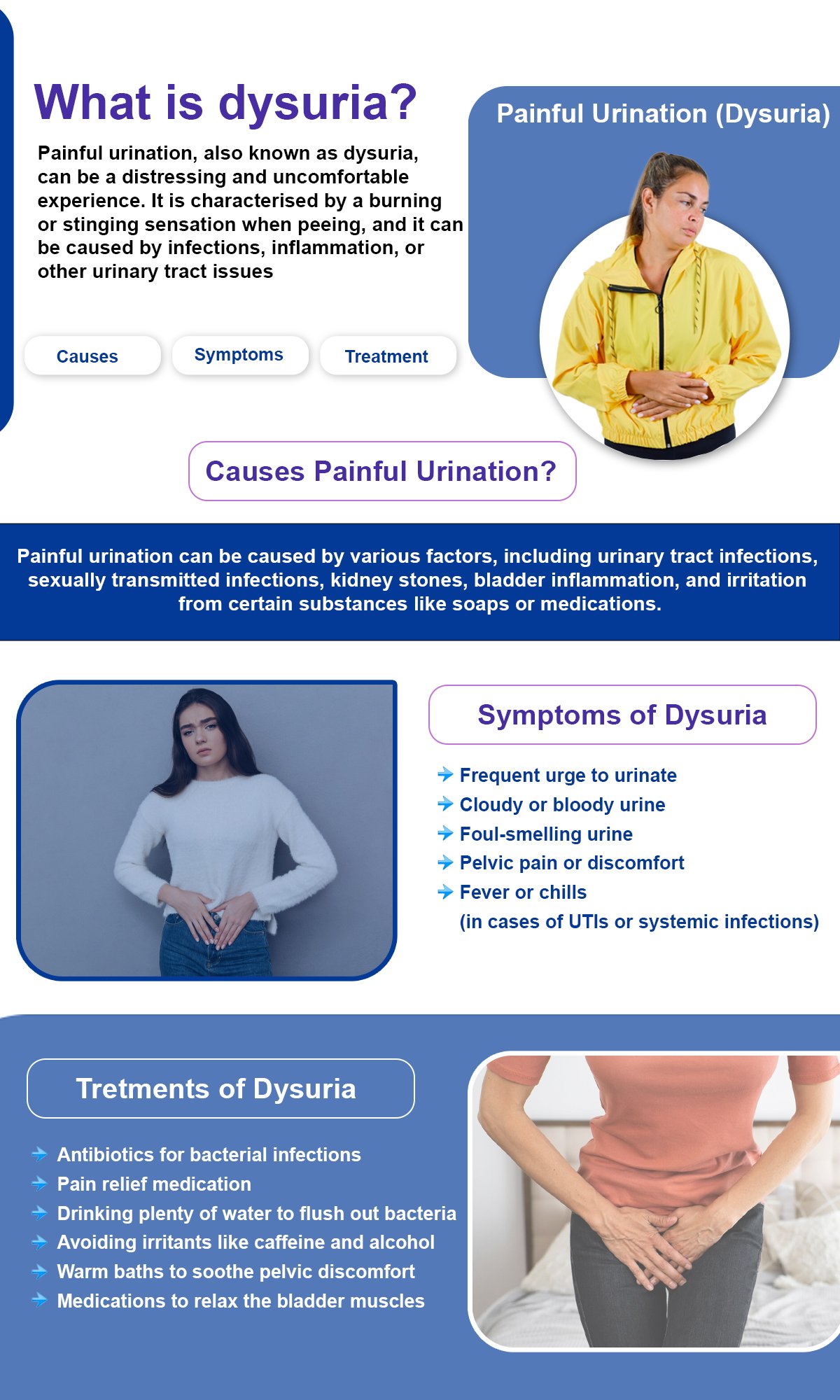Painful urination, also known as dysuria, can be a distressing and uncomfortable experience. It is characterized by a burning or stinging sensation when peeing, and it can be caused by various underlying factors. In this blog, we will explore the causes, symptoms, and treatment options for dysuria, aiming to provide a comprehensive understanding of this condition and how to alleviate its discomfort.
What Causes Painful Urination?
Several factors can contribute to dysuria, ranging from infections to anatomical abnormalities. Some common causes include:
- Urinary Tract Infections (UTIs): UTIs are among the most prevalent causes of painful urination. They occur when bacteria enter the urinary tract, leading to inflammation and irritation of the bladder or urethra.
- Sexually Transmitted Infections (STIs): Certain STIs, such as chlamydia and gonorrhoeic, can cause dysuria. These infections affect the genital area and may spread to the urinary tract, causing discomfort during urination.
- Irritants: Contact with irritants like perfumed soaps, bubble baths, or certain fabrics can irritate the delicate tissues of the genital area, resulting in painful urination.
- Kidney Stones: The presence of kidney stones can obstruct the urinary tract, causing pain and discomfort during urination as well as other symptoms such as blood in the urine and flank pain.
- Urethritis: Inflammation of the urethra, known as urethritis, can cause of burning in urine. This condition may be triggered by bacterial infections or noninfectious factors.
- Interstitial Cystitis: Interstitial cystitis is a chronic bladder condition characterized by bladder pain and urinary urgency. People with this condition may experience dysuria along with other urinary symptoms.

Symptoms of Dysuria(Painful Urination):
The primary dysuria symptoms is a sharp or burning pain when peeing. This discomfort can range from mild to severe and may be accompanied by an increased frequency of urination or an urgent need to pee. Other symptoms may include:
- Frequent urge to urinate
- Cloudy or bloody urine
- Foul-smelling urine
- Pelvic pain or discomfort
- Fever or chills (in cases of UTIs or systemic infections)
Treatment of Dysuria:
The treatment approach for dysuria depends on the underlying cause. Here are some common treatment options:
- Antibiotics: If a bacterial infection such as a UTI or STI is identified as the cause of dysuria, antibiotics may be prescribed to eradicate the infection. It’s essential to complete the full course of antibiotics as directed by your healthcare provider to prevent recurrence.
- Pain Management: Over-the-counter pain relievers such as ibuprofen or acetaminophen can help alleviate discomfort during urination. Additionally, your doctor may prescribe medications specifically for bladder pain or spasms.
- Hydration: Drinking plenty of water can help flush out bacteria from the urinary tract and alleviate dysuria symptoms. Aim to drink at least eight glasses of water a day, unless otherwise advised by your healthcare provider.
- Avoiding Irritants: Identify and avoid potential irritants that may exacerbate dysuria, such as perfumed soaps, harsh detergents, or certain foods and beverages. Opt for gentle, unscented products for personal hygiene.
- Lifestyle Modifications: Making lifestyle changes such as practicing good hygiene habits, wearing breathable underwear, and urinating before and after sexual activity can help prevent recurrent episodes of dysuria.
- Medical Procedures: In some cases, medical procedures may be necessary to address underlying conditions contributing to dysuria. For example, kidney stones may require removal through lithotripsy or surgical intervention.
Preventive Measures:
While not all cases of dysuria can be prevented, there are steps you can take to reduce your risk:
- Practice Good Hygiene: Maintain proper hygiene practices, including regular bathing and wiping from front to back after using the toilet to prevent the spread of bacteria to the urinary tract.
- Stay Hydrated: Drink an adequate amount of water daily to promote urinary tract health and prevent dehydration, which can increase the risk of UTIs.
- Safe Sexual Practices: Practice safe sex by using condoms and limiting the number of sexual partners to reduce the risk of STIs that can cause dysuria.
- Prompt Treatment of Infections: Seek prompt medical attention if you experience symptoms of a urinary tract or genital infection to prevent complications and recurrent episodes of dysuria.
When to Seek Medical Attention:
While mild cases of dysuria may resolve on their own or with simple home remedies, it is important to seek medical attention if the symptoms persist or worsen. If the pain when peeing is severe, accompanied by fever, back pain, or blood in the urine, it may indicate a more serious condition that requires prompt evaluation by a healthcare professional. Timely diagnosis and treatment are crucial in managing dysuria and preventing potential complications.
Conclusion
In conclusion, painful urination, or dysuria, can be caused by various factors, including infections, irritants, and underlying medical conditions. Recognizing the symptoms of dysuria and seeking appropriate medical care are essential in managing this discomfort. By understanding the causes, symptoms, and treatment options for dysuria, individuals can take proactive steps to alleviate pain when peeing and promote urinary tract health. Practicing good hygiene, staying hydrated, and seeking timely medical attention when needed are key in managing dysuria and promoting overall well-being.
If in doubt, consulting a urology specialist ensures a timely and accurate diagnosis, leading to appropriate treatment and resolution of any underlying issues. You can contact and book an appointment with Dr. Saket Narnoli, who is known to be the Best Urologist in Dhanbad Providing Excellent Urological Services. With a tailored treatment plan and lifestyle modifications, urinary retention can usually be managed successfully.






